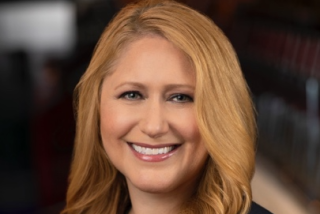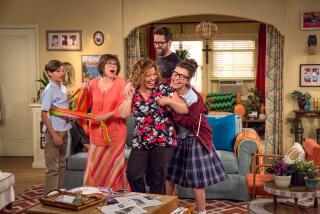ABC ending soaps ‘All My Children’ and ‘One Life to Live’
Succumbing to shifts in audience tastes, ABC is ending two long-running soap operas, “All My Children” and “One Life to Live,” and replacing them with lower-cost lifestyle shows.
The cancellations, announced Thursday, mark the latest upheaval in daytime network television. Once a dominant source of escapism for tens of millions of women, the genre is losing ground to scores of cable TV networks, the Internet and social media. The move also comes just as two icons of the daytime screen, Oprah Winfrey and Regis Philbin, are getting ready to exit the stage after decades on the air, underscoring the biggest shakeup in daytime in a generation.
All the networks are grappling with what to do with a swath of the TV day that used to be a reliable and lucrative profit center but in recent years has faced increased financial pressure. A little more than a year ago, Walt Disney Co.-owned ABC moved production of “All My Children” to Los Angeles from New York to take advantage of lower production costs.
But ratings for “All My Children” plummeted this season, more than 25%, forcing ABC’s hand.
“You can’t cut costs enough to make up for those losses,” said Brian Frons, president of daytime programming for the Disney ABC Television Group. “There comes a point when you can no longer justify the expense.”
“All My Children,” which premiered in 1970 and tackled once-taboo social topics, including racism, AIDS, lesbian relationships and teenage alcoholism, will finish its run in September. “One Life to Live,” which debuted two years earlier — a few months before Richard Nixon was elected president — will be retired next January. The dramas will be replaced by food-focused and makeover shows, “The Chew” and “The Revolution.”
At one time ubiquitous, only four network soap operas will remain: “General Hospital” on ABC, “The Young and the Restless” and “The Bold and the Beautiful,” both on CBS, and “Days of Our Lives” on NBC.
“Soap operas are an expensive way to program a network and unless you have “General Hospital”- or “Young and the Restless”-sized ratings, it’s really not a business,” Frons said.
That’s because, by employing large staffs of writers, producers and crew members and utilizing soundstages that require multiple sets, soap operas cost about $50 million annually to produce, according to industry executives — about 30% more than talk shows.
ABC is only the latest network to retreat from soaps. CBS two years ago canceled “Guiding Light” and “As the World Turns,” both created by consumer products giant Procter & Gamble Co. to sell soap and other household products.
“When I started writing about soaps in 1999, there were 11 on the air,” said Linda Marshall-Smith, founder of Soapdom, an Internet news site based in Los Angeles. “Now there are going to be four, and the clock is ticking. How much longer are we going to see any soap operas on TV?”
Fifteen years ago, soap operas routinely drew in more than 5 million viewers an episode. Now only CBS’ “Young and the Restless,” produced by Sony Pictures Television, draws such a large audience. “Bold and the Beautiful,” also on CBS, averages about 3 million viewers, according to Nielsen Co. ABC’s “General Hospital” this season has 2.8 million viewers.
This season, “All My Children,” which takes place in the fictional Pine Valley and stars Susan Lucci as the villainous Erica Kane, drew nearly 2.5 million viewers. That’s down from 3.2 million five years ago. “One Life to Live,” set in a Philadelphia-like suburb called Llanview, has drawn an average of 2.6 million viewers this season. Both were created by the doyenne of soaps, 83-year-old Agnes Nixon.
As problematic as attracting fewer viewers, the audience for soap operas has become increasingly gray, which does not portend well for growth.
“ABC feels that the soap operas weren’t bringing in as many younger viewers as they have been in the past,” said Jackie Kulesza, a senior vice president at advertising buying agency Starcom. “And for their ratings to grow they are going to need younger viewers coming to the channel.”
More than 30 years ago, ABC’s soaps were among the hottest shows around.
“ABC’s promotional slogan was ‘love in the afternoon,’” Marshall-Smith said. “Their soaps were more hip, and their storytelling style was more youth-oriented — even back in the 1970s. It was hot sex, six-pack abs and people ripping their clothes off, and that really appealed to the college-aged crowd.”
Another strike against the soaps was Disney’s decision to convert its SoapNet cable channel next year to Disney Junior to appeal to preschoolers. Until now, ABC has been able to spread the cost of the soap operas between two channels.
A year ago, Frons said, when ABC executives were projecting the long-term finances of its shows they saw the situation becoming increasingly dicey. “We saw that there were a couple of shows that were not going to be profitable and we said, ‘We’ve got a huge problem,’ ” he said. At that point, the network ordered pilots for possible replacement shows.
Viewers, Frons said, are more interested in upbeat lifestyle and informational shows. For example, ABC’s morning talk show “The View” this season has pulled in some of its best ratings — an average of 3.7 million viewers an episode — second only to the 2008 season that was fueled by interest in the presidential election.
“Advertisers like soap operas — they have a very loyal audience,” said Starcom’s Kulesza. “But there are more ways for advertisers to get involved with a show like “The Chew” than “All My Children.” ABC is able to monetize those advertiser integrations; that way they can get more revenue than just from the 30-second commercial spots in the show.”







